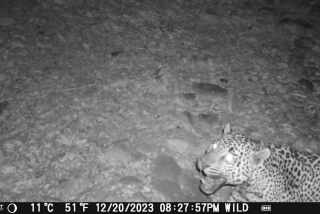Huge, Crocodilian Dinosaur Fossil Find Described
- Share via
From beneath the wind-whipped dunes of western Africa, fossil hunters have unearthed a previously unknown species of dinosaur: a 100-million-year-old predator the size of a city bus with 16-inch hook-shaped thumb claws and a snout like a mutant crocodile.
At 36 feet long and 12 feet high, with an estimated weight of 5 tons, Suchomimus tenerensis was at least as big as the average tyrannosaur. But its lifestyle was considerably different: It presumably preferred a diet of fish.
“It’s a dinosaur trying hard to be a crocodile,” said Paul C. Sereno of the University of Chicago, who led the 18-person international expedition that discovered the creature’s remains in remote central Niger late last year.
In the dinosaur era, the area “was a lush climate that could support many different species of dinosaurs,” Sereno said.
His group amassed 400 pieces of bone, yielding a 70% complete skeleton, including the hugely powerful 4-foot-long forelegs with bones several inches thick and three claws on each limb. “That’s the strongest forelimb of any predatory dinosaur,” Sereno said.
“If you were standing next to it, your eye level would be at its knee,” Sereno said. “This animal was easily the size of Tyrannosaurus rex. And it was not fully grown.”
The results, including a full-scale skeletal model, were displayed Thursday at a news conference at the National Geographic Society, which partly funded the research, and the find is reported in today’s issue of the journal Science.
Although Suchomimus apparently was a fish eater, said Sereno, it could threaten virtually anything around it.
“With its forearms and its jaws, it would have been able to take down just about anything,” Sereno said. “It was the dominant predator of its time.”
Suchomimus (from the Greek for “crocodile-mimic”) belongs to the familiar theropod group of bipedal carnivores that includes tyrannosaurs and the velociraptor, and which is thought to comprise the ancestors of modern birds.
More to Read
Sign up for Essential California
The most important California stories and recommendations in your inbox every morning.
You may occasionally receive promotional content from the Los Angeles Times.











